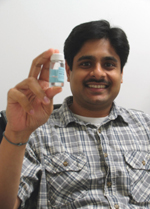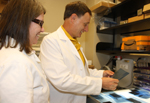|
What
FirstString Research
Inc. exclusively was licensed to move forward with Phase II trials.
FirstString Research Inc., a biotechnology company that arose from an
MUSC lab, received two patents for intellectual property protection for
further development and commercialization of its regenerative medicine
technology.
The
Researchers
The first patent,
issued late last year, was a "composition of matter" patent for a
regenerative technology platform invented in an MUSC lab by Robert
Gourdie, Ph.D., Gautam Ghatnekar, Ph.D., FirstString Research President
and CEO, and lab manager Jane Jourdan. Gourdie also is a FirstString
scientific advisory board member.

Dr. Gautam Ghatnekar with the peptide gel.
How it Works
The technology's first
application takes the form of a wound-healing/scar-reduction peptide
gel by FirstString Research. The second patent, issued this month, is a
"methods of use" patent, meaning that the peptide-gel can be used for
multiple medical applications. Both patents provide protection and
exclusivity through 2026.
The peptide works by
inhibiting the production of scar tissue and catalyzing the production
of new tissue to heal a wound, similar to how a lizard might re-grow
its tail if it were injured. The discovery in Gourdie's laboratory of
the peptide's ability to reduce scar tissue, while also promoting heart
cell electrical function, turned into a two-for-one exchange. The
peptide also is being developed for translational uses in heart and
spinal injury patients, as well as those who suffer from macular
degeneration or cardiac arrhythmias.
Did you Know
This collaborative
pipeline of biotechnology involving MUSC and FirstString serves as a
successful model of how academic medical centers can produce spin-off
companies to improve human health. As FirstString pursues
commercialization of the peptide for several clinical uses, Gourdie's
lab will continue to work on additional promising internal applications
such as the peptide's anti-arrhythmia effects, and its use for other
cardiac and spinal injuries.
 Dr. Rob Gourdie in his lab. Dr. Rob Gourdie in his lab.
The peptide was
originally developed by Gourdie in his lab at MUSC for use as a
laboratory tool in understanding electronic signaling within heart
muscles and was further developed by Ghatnekar to have translational
benefits at the bedside. Ghatnekar realized the peptide's potential to
decrease scar tissue and heal wounds faster in laboratory animals when
he worked as a postdoctoral fellow in Gourdie's lab. After the
additional application was considered for the peptide, the group
developed a topical gel that was shown to decrease scar tissue and heal
wounds faster in laboratory mice. Subsequently, this led to the
formation of FirstString by Ghatnekar and Gourdie.
What's Next
Galvanized by the award
of these two patents and results in Switzerland, FirstString plans to
launch a Phase II clinical trials with more than 270 patients in 2011,
pending regulatory approval. These trials will further test two topical
functions of the wound-healing peptide gel: faster healing of difficult
to heal wounds such as diabetic foot and venous leg ulcers and
reduction of scars associated with surgical wounds. Eventual
commercialization of this work could lead to decreased medical costs
related to these conditions and enhanced
quality of life.
"The progress made
by FirstString exemplifies MUSC's commitment to translate breakthrough
research into clinical applications that further solidify its role as a
partner for companies seeking to explore economic opportunities in the
biotech sector," said Ghatnekar. "We are incredibly excited about its
impact on patients who will benefit from the applications of this
regenerative medicine technology."
|




 Dr. Rob Gourdie in his lab.
Dr. Rob Gourdie in his lab.